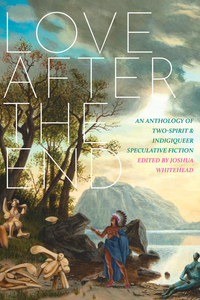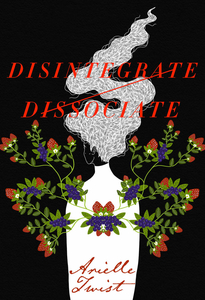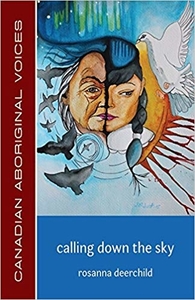“Tomorrow will be kinder,” I whisper as I am swept into the rushing river of my dreams. —”The Ark of the Turtle’s Back” by jaye simpson Love After the End: An Anthology of Two-Spirit and Indigiqueer Speculative Fiction, edited by Joshua Whitehead, is a follow up to the anthology Love Beyond Body, Space, and Time. TheseRead More
Danika reviews Love after the End edited by Joshua Whitehead
Love after the End: An Anthology of Two-Spirit & Indigiqueer Speculative Fiction edited by Joshua Whitehead is a collection of science fiction and fantasy short stories by Indigenous authors. It’s edited and introduced by Joshua Whitehead, the author of Jonny Appleseed and full-metal indigiqueer. In that introduction, Whitehead reflects on the intersection between Indigeneity and queerness:Read More
Mo Springer reviews A Two-Spirit Journey: The Autobiography of a Lesbian Ojibwa-Cree Elder by Ma-Nee Chacaby with Mary Louisa Plummer
Trigger Warning: This book graphic depictions of physical and sexual assault My kokum explained that two-spirit people were once loved and respected within our communities, but times had changed and they were no longer understood or valued in the same way. When I got older, she said, I would have to figure out how toRead More
Sheila reviews Disintegrate/Dissociate by Arielle Twist
I wanted to read something shorter, that I could put down and come back to as my attention comes and goes these days. I was very happy to pick up (or download, whatever) this work of poetry, Disintegrate/Dissociate by Arielle Twist. This isn’t to say that these poems are of a lighter subject manner. ManyRead More
Sheila Laroque reviews A Two-Spirit Journey: The Autobiography of a Lesbian Ojibwa-Cree Elder by Ma-Nee Chacaby
I gravitate towards autobiography and memoir writing, so I was delighted to find this autobiography when I was browsing for something to read. This is the personal narrative of Ma-Nee’s life, and a great documentation about all of the changes that she has experienced. From living out on the land, to being closer with communitiesRead More
Sheila Laroque reviews Calling Down the Sky by Rosanna Deerchild
I’m not much of a poetry person. I never have been. I’m the type of librarian who only took the required English courses; and I definitely don’t have an English literature degree. However, I wanted to challenge myself to diversify my reading beyond what I usually go for. I admit that I avoid poetry becauseRead More
Sheila Laroque reviews Love Beyond Body Space and Time: An Indigenous LGBT Sci-Fi Anthology edited by Hope Nicholson
For readers who are interested in having more Indigenous writers in their reading material, Love Beyond Body, Space & Time is a great entry point into Indigenous-centered science fiction. This collection of short stories seeks to showcase the ways that science fiction and aspects of Indigenity are not contradictions. In many science fiction tropes, the narrativeRead More


